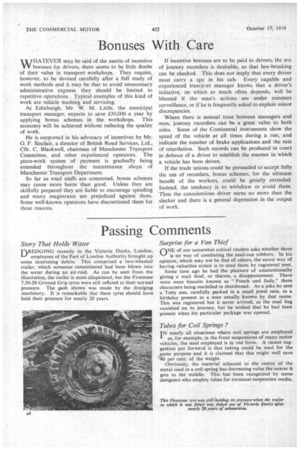Bonuses With Care
Page 42

If you've noticed an error in this article please click here to report it so we can fix it.
WHATEVER may be said of the merits of incentive bonuses for drivers, there seems to be little doubt of their value in transport workshops. They require, however, to be devised carefully after a full study of work methods and it may be that to avoid unnecessary administrative expense they should be limited to repetitive operations. Typical examples of this kind of work are vehicle washing and servicing.
At Edinburgh, Mr. W. M. Little, the municipal transport manager, expects to save £30,000 a year by applying bonus schemes in the workshops. This economy will be achieved without reducing the quality of work.
He is supported in his advocacy of incentives by Mr, G. F. Sinclair, a director of British Road Services, Ltd., Ur. C. Blackwell, chairman of Manchester Transport Committee, and other experienced operators. The piece-work system of payment is gradually being extended throughout the maintenance shops of Manchester Transport Department.
So far as road staffs are concerned, bonus schemes may cause more harm than good. Unless they are skilfully prepared they are liable to encourage speeding and many magistrates are prejudiced against them. Some well-known operators have discontinued them for these reasons. If incentive bonuses are to be paid to drivers, the use of journey recorders is desirable, so that law-breaking can be checked. This does not imply that every driver must carry a spy in his cab. Every capable and experienced transpprt manager knows that a driver's initiative, on which so much often depends, will be blunted if the man's actions are under constant surveillance, or if he is frequently asked to explain minor discrepancies.
Where there is mutual trust between managers and men, journey recorders can be a great value to both sides. Some of the Continental instruments show the speed of the vehicle at all times during a run, and indicate the number of brake applications and the rate of retardation. Such records can be produced in court in defence of a driver to establish the manner in which a vehicle has been driven.
If the trade unions could be persuaded to accept fully the use of recorders, bonus schemes, for the ultimate benefit of the workers, could be greatly extended. Instead, the tendency is to withdraw or avoid them. Thus the conscientious driver earns no more than the slacker and there is a general depression in the output of work.




















































































































